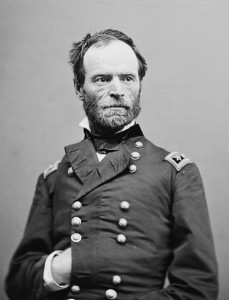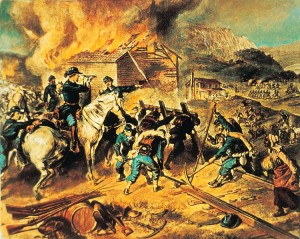General Sherman 200
February 7, 2020
Tomorrow, February 8, marks 200 years since the 1820 birth of William Tecumseh Sherman, a leading Union general in the American Civil War (1861-1865). Sherman was most famous for his “march to the sea,” across Georgia, in 1864 and for his march through South and North Carolina in 1865. On these marches, Sherman’s troops destroyed much of the South’s military and economic resources.

The American Civil War general William Tecumseh Sherman was born 200 years ago on Feb. 8, 1820. Credit: Library of Congress
In 1861, Sherman served as a colonel in the First Battle of Bull Run. After the battle, he was promoted to brigadier general. In 1862, Sherman fought under General Ulysses S. Grant in the Battle of Shiloh. In July 1863, he helped Grant capture Vicksburg, Mississippi, a major Confederate stronghold on the Mississippi River. In November, he helped drive Confederate forces from Chattanooga, Tennessee.

Sherman’s march through Georgia was aimed at destroying any civilian and industrial property that might help the South continue fighting. Union troops tore up railroad tracks and burned property as they swept across the state on a path 50 miles (80 kilometers) wide. Atlanta was left in flames, shown here. Credit: Corbis-Bettmann
In 1864, Sherman led an army that captured Atlanta, Georgia, and burned most of it. He then began his “march to the sea.” On the march, his troops stripped barns, fields, and some houses. Sherman hoped that the terrible destruction would break the South’s will to continue fighting. The march ended at Savannah, Georgia, a major port near the Atlantic Ocean. Sherman then marched north through South Carolina. His troops continued to seize or destroy property in their path. Most of Columbia, the state capital, was burned. The Confederates blamed Sherman for the fire, but Sherman denied that his troops had set it. After leaving Columbia, Sherman continued north into North Carolina. There, Confederate General Joseph E. Johnston tried to stop Sherman. But Johnston had only about a third as many troops as Sherman did, and Sherman continued his march. In April 1865, Johnston surrendered to Sherman near Durham, North Carolina.
Sherman was born on Feb. 8, 1820, in Lancaster, Ohio. His father, an Ohio Supreme Court justice, died when William was 9 years old. After his father’s death, William went to live with the family of Thomas Ewing, an Ohio politician. In 1840, Sherman graduated from the United States Military Academy at West Point, New York. He fought in Florida in the Second Seminole War (1835-1842). After the Civil War, Sherman served as commanding general of the United States Army from 1869 to 1883. He died on Feb. 14, 1891.


